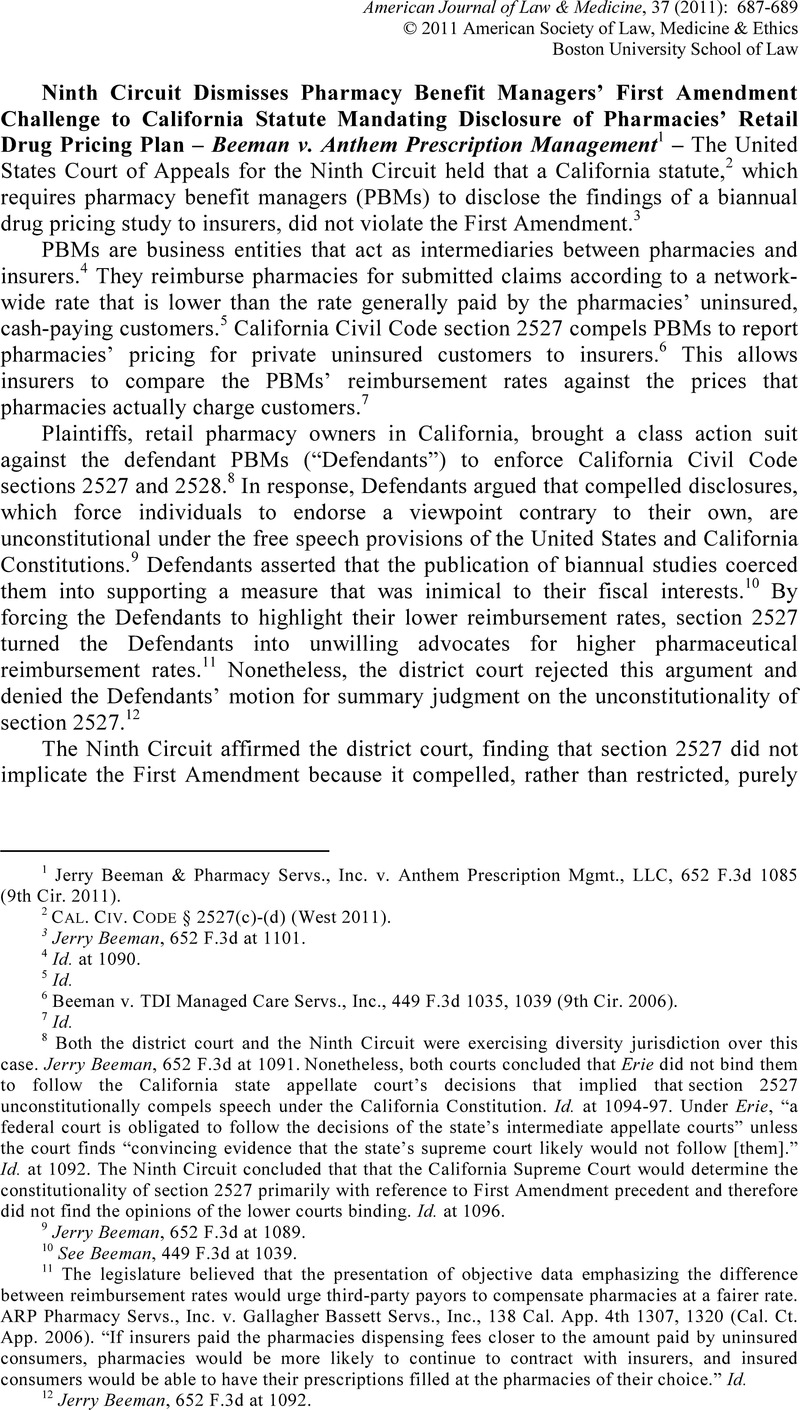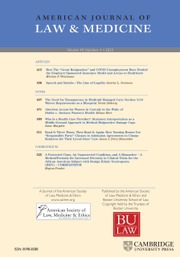No CrossRef data available.
Article contents
Ninth Circuit Dismisses Pharmacy Benefit Managers' First Amendment Challenge to California Statute Mandating Disclosure of Pharmacies' Retail Drug Pricing Plan – Beeman v. Anthem Prescription Management
Published online by Cambridge University Press: 06 January 2021
Abstract

- Type
- Recent Case Developments
- Information
- Copyright
- Copyright © American Society of Law, Medicine and Ethics and Boston University 2011
References
1 Jerry Beeman & Pharmacy Servs., Inc. v. Anthem Prescription Mgmt., LLC, 652 F.3d 1085 (9th Cir. 2011).
2 CAL. CIV. CODE § 2527(c)-(d) (West 2011).
3 Jerry Beeman, 652 F.3d at 1101.
4 Id. at 1090.
5 Id.
6 Beeman v. TDI Managed Care Servs., Inc., 449 F.3d 1035, 1039 (9th Cir. 2006).
7 Id.
8 Both the district court and the Ninth Circuit were exercising diversity jurisdiction over this case. Jerry Beeman, 652 F.3d at 1091. Nonetheless, both courts concluded that Erie did not bind them to follow the California state appellate court's decisions that implied that section 2527 unconstitutionally compels speech under the California Constitution. Id. at 1094-97. Under Erie, “a federal court is obligated to follow the decisions of the state's intermediate appellate courts” unless the court finds “convincing evidence that the state's supreme court likely would not follow [them].” Id. at 1092. The Ninth Circuit concluded that that the California Supreme Court would determine the constitutionality of section 2527 primarily with reference to First Amendment precedent and therefore did not find the opinions of the lower courts binding. Id. at 1096.
9 Jerry Beeman, 652 F.3d at 1089.
10 See Beeman, 449 F.3d at 1039.
11 The legislature believed that the presentation of objective data emphasizing the difference between reimbursement rates would urge third-party payors to compensate pharmacies at a fairer rate. ARP Pharmacy Servs., Inc. v. Gallagher Bassett Servs., Inc., 138 Cal. App. 4th 1307, 1320 (Cal. Ct. App. 2006). “If insurers paid the pharmacies dispensing fees closer to the amount paid by uninsured consumers, pharmacies would be more likely to continue to contract with insurers, and insured consumers would be able to have their prescriptions filled at the pharmacies of their choice.” Id.
12 Jerry Beeman, 652 F.3d at 1092.
13 Id. at 1101.
14 Id. at 1100.
15 Id.
16 Id.
17 Id. at 1101.
18 Id.
19 Id. at 1111 (Wardlow, J., dissenting) (citing Sorrell v. IMS Health Inc., 131 S. Ct. 2653 (2011)Google Scholar).
20 The factual information that was restricted in Sorrell was the “prescriber-identifying information” that pharmacies receive when they process prescriptions. Sorrell, 131 S. Ct. at 2656. Pharmacies would sell this information to “data miners,” who would use this data to produce reports on prescriber behavior and lease these reports to pharmaceutical manufacturers. Id. Subsequently, the pharmaceutical manufacturers would rely on prescriber behavior data to market products directly to targeted physicians. Id.
21 Jerry Beeman, 652 F.3d at 1111 (Wardlow, J., dissenting).
22 Sorrell, 131 S. Ct. at 2666-67 (quoting IMS Health Inc. v. Sorrell, 630 F.3d 263, 271 (2d Cir. 2010), aff’d, 131 S. Ct. 2653).
23 Jerry Beeman, 652 F.3d at 1111 (Wardlow, J., dissenting) (quoting Jerry Beeman, 652 F.3d at 1100 n.14).
24 Id. at 1100 n.14.
25 Id.
26 Sorrell, 131 S. Ct. at 2667.
27 Jerry Beeman, 652 F.3d at 1111 (Wardlow, J., dissenting).
28 Id. (Wardlow, J., dissenting) (quoting Riley v. Nat’l Fed’n of the Blind of N.C., 487 U.S. 781, 796 (1988)).
29 Id. (Wardlow, J., dissenting) (citing Sorrell, 131 S. Ct. at 2666-67).




